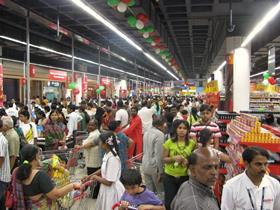
As part of a raft of new changes to help boost its flagging economy, India’s government announced on Friday it would open its multi-brand retail sector to foreign direct investment (FDI).
While many in the fresh produce industry have long hailed the potential benefits of modernising the sector the reforms have come up against political opposition already with opponents of the ruling Congress party, as well as a key ally, protesting the reforms.
A similar move last November to liberalise the multi-brand retail sector was quickly shelved following widespread political opposition.
This time, however, amendments to reform legislation allow individual states to decide whether or not to allow FDI. The cap on foreign investment has also been lowered from 51 per cent to 49 per cent.
Keith Sunderlal of the SCS Group told Fruitnet.com it would take time for modern retail to develop under the new policy.
“The impact of this development will be felt gradually due to continued stiff opposition from a broad spectrum of political parties,” he said. “While the federal government is no longer the gate-keeper, the final decision has now been left to the states.
“Some Congress party-led states are in favour and are expected to implement these rules immediately, some states will be more cautious and await positive stories from other states' experience,” he added.
The Times of India has reported Karnataka was unlikely to allow FDI as it was governed by the Bharatiya Janata Party that has been vocal in it’s opposition of the reform.
Meanwhile the Business Standard reported the states of Uttar Pradesh, Chattisgarh, Madhya Pradesh and Himachal Pradesh, were also unlikely to allow FDI.
Opposition to opening the multi-brand retail sector was based on the assumption it would wipe out smaller, traditional players, who dominate the sector.
Arvind Singhal of retailing consultancy Technopak Advisors refutes this, however. “Even when modern retail started in India there was hullabaloo that the mom-and-pop stores will be wiped away. This has been proven to be wrong. And if Indian retailers have not managed to harm the unorganised sector, there is no way foreign investments will. It has been already proven that both organised and unorganised sectors can co-exist without much friction,” he told local media.
The new policy development was also good news for US exporters of premium foods into the Indian market, said Sunderlal, who is involved in promotion of fresh California grapes, Washington apples, USA pears, Sunkist citrus and other premium foods like Italian olive oils and US snacks.
“Modern retail brings much-needed shelf space to marketers in their efforts to reach-out to a choice starved Indian populace. Growth will come from both domestic players such as Reliance, Spencers and Hypercity and foreign retailers like Walmart, Tesco, and Carrefour who have been marking time with domestic joint-venture partners fine-tuning their globally successful retail models. Walmart is clearly ahead of the other two foreign retailers in their Indian foray with their multiple format store-fronts and a very astute combination of large metro, second tier cities and semi-urban locations,” he said.
“We consider this a positive development for our continued market development efforts for the premium foods category in India. Most products should continue to show growth of 20 to 30 percent annually.”
It is widely believed modern retail will lead to a flurry of investment into India’s substandard supply chain infrastructure. The new policy requires foreign retailers allocate 50 per cent of their investment to setting up back-end operations and that 30 per cent of sourcing is done from small and medium domestic enterprises.
Foreign retailers would also be restricted to setting up outlets in cities with a population of more than one million. This would allow them to set up in 53 cities.
The government announced last week that more foreign ownership in airlines and broadcasters would also be allowed as well as a lowering of diesel subsidies.



